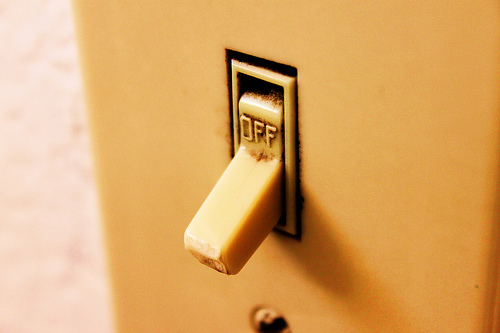
In my blogathon post, I wrote about ten reasons why I choose to live without electricity in my house. Inspired by some of our readers’ comments, I offer this follow-up post to further explain my choice to build a home without electricity. Choosing to live in a home without electricity is one of the battles I’ve chosen to fight to live more ecologically. It’s a battle I consider to be one of the biggest steps towards a truly sustainable future.
I live at Dancing Rabbit Ecovillage, an intentional community devoted to sustainable living. There are but a few ecological covenants and guidelines that members agree to live by, but beyond those few “rules” (such as one that states all energy must come from renewable sources), it is up to members to decide how they want to live. There is nothing saying that members must eat only local food, or that they can only drive some number of miles in a vehicle per year. Members make choices based on their own ecological values, under the umbrella of the covenants and guidelines. There are many battles to fight, and members must choose which of those are most important to them.
What does it mean to be sustainable?
In my own quest to live more sustainably, I’ve chosen to try to live with less electricity. In my eyes, to live sustainably means to live a lifestyle that can continue forever, to use the resources that are immediately available, and without causing deep ecological harm. Since I can’t make my own solar panels or wind turbine or deep cycle batteries, I’ve decided to live without electricity in my home. (Well, that’s just one of a few reasons – see my original post for more.) In short, I am interested in helping to craft a lifestyle that is self-sufficient, and not dependent on resources from afar, and does not include those things that I cannot make for myself. And that means that electricity is not in my ideal, sustainable future.
Self-sufficiency is a long road
However, to create this lifestyle is a long road. Self-sufficiency does not happen in a day, a week, or even a year. It takes time to live truly ecologically, truly sustainably. It requires looking at the world through a completely different set of eyes than the ones our culture has given us.
And so by choosing to live in a house without electricity, I have made a long leap to live more sustainably. My electricity usage is clearly not zero, but I have cut down on my need for it significantly, and thus, my goal of living sustainably is that much closer.
Not everyone is willing or even wants to live without electricity, which I completely understand. However, it’s important to realize what is actually possible (and probable) when you look at the world with the goal of living a no impact lifestyle. Do light bulbs and computers and power tools fit into that sustainable future scenario? You be the judge…
Want to live with less electricity? Take a look at our selection of energy efficient electronics.
Image credit:


heckety
Your title is spot on and at the very bed rock of everything we do- or don’t do. What IS truly sustainable? I wrestle with it and come to few conclusions. Sometimes ‘lesser evil’ is the best I can do, and obviously that is NOT GOOD ENOUGH.
For instance- we installed solar panels to heat our hot water, which means that from Feb to Nov our oil costs are far lower than with out the panels, but what of the manufacture of the panels? What did they cost in terms of sustainability?
I like your explanation on what should be the absolute definition os sustaina bility- ‘a life style that can continue forever.’ I’m writing that down.